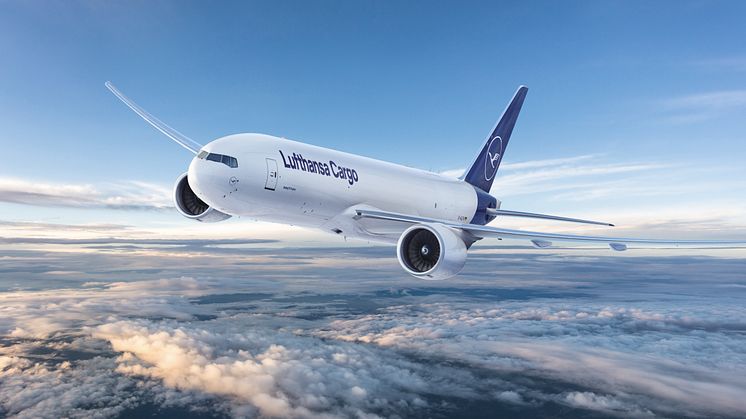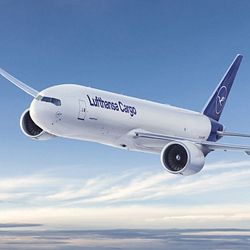
Press release -
Lufthansa Cargo includes additional costs for SAF quotas in the price index of the Airfreight Surcharge
- Established surcharge concept will be retained
- From January 1, 2025, SAF prices will be monitored via the index
- The airline cannot bear the increasing environmental costs of mandatory blending on its own
- Targeted political support strategies are needed for a competitive SAF market.
From January 1, 2025, Lufthansa Cargo will include the rising costs of sustainable aviation fuel (SAF) due to regulatory environmental requirements in the price index of its existing Airfreight Surcharge (ASC). For departures from European Union (EU) countries, a mandatory SAF blending rate of initially two percent will apply from 2025. Countries outside the EU are also planning to introduce or have already introduced mandatory SAF blends. The Indian government, for example, is working on a mandatory quota of one to five percent from 2027. Singapore is requiring airlines to add one percent SAF to flights departing from Changi Airport starting in 2026. The target is three to five percent by 2030. By then, the EU will require six percent, and the UK and Japan will require ten percent.
SAF is a crucial technological key to more sustainable flying and is essential for the energy transition in aviation. However, the aviation industry cannot initiate a competitive SAF market on its own. A targeted policy support strategy is required. Significantly more use of SAF is only possible if its supply volumes and availability increase substantially as quickly as possible and the prices fall accordingly. Biogenic SAF is currently available in small quantities and 3-5 times more expensive than fossil fuel. A targeted policy strategy is needed to be able to meet the volumes for the blending rates and beyond.
How does the Airfreight Surcharge work?
The ASC has been in effect since 2015. It is a combined surcharge to cover additional costs that cannot be influenced by Lufthansa Cargo. So far, these have mainly been rising fuel, currency and security prices. The flexible and fair system works as follows: Lufthansa Cargo monitors the development of additional costs using a standardized index calculation system. If the indexed costs require an upward or downward adjustment to the ASC, the cargo carrier will review and determine the appropriate adjustment. The ASC is added to the net price of each shipment. In some countries, regulations do not allow surcharges or only allow them to be applied in other ways. This may result in different surcharge levels from country to country.
Systematic climate targets
As one of the world's leading cargo airlines, Lufthansa Cargo's mission is to enable global business and connect countries and markets in the most sustainable way possible. Together with the Lufthansa Group, the company has set itself ambitious climate protection targets and aims to achieve a neutral CO₂ balance by 2050. By 2030, Lufthansa Cargo aims to halve its net CO₂ emissions compared to 2019 through reduction and compensation measures, and is relying in particular on a state-of-the-art fleet, the use of sustainable aviation fuels, the continuous optimization of flight operations and optional offers to make the transportation of cargo more sustainable.
The add-on service “Sustainable Choice” continues to enable customers to have their shipments transported more sustainably by Lufthansa Cargo through the use of SAF and contributions to a high-quality climate protection project portfolio. The SAF portion of the add-on service can be accounted for by emission reduction certificates.
Background SAF
Individual flights are not fueled with pure SAF. As a so-called "drop-in" fuel, SAF is compatible with fossil kerosene and can be easily added to it. Before being transported to the airport, SAF is blended with fossil aviation fuel and then fed into the airport infrastructure. The Lufthansa Group ensures that the amount of SAF required to offset individual CO₂ emissions is fed into the Lufthansa Group's flight operations within six months of purchase. Over its entire life cycle, SAF made from biogenic residues has a carbon footprint that is approximately 80 percent lower than that of conventional kerosene made from fossil crude oil.
Topics
Lufthansa Cargo AG
With revenue of 3.0 billion euros and a transport performance of 7.5 billion freight ton kilometers in 2023, Lufthansa Cargo is one of the world's leading companies in the transport of airfreight. The company currently employs around 4,150 people worldwide. Lufthansa Cargo's focus is on the airport-to-airport business. The route network covers around 300 destinations in more than 100 countries, using both freighter aircraft and cargo capacity from passenger aircraft operated by Lufthansa, Austrian Airlines, Brussels Airlines, Discover Airlines and SunExpress, as well as trucks. The majority of the cargo business is handled via Frankfurt Airport. Lufthansa Cargo is pursuing the goal of becoming the world's most environmentally friendly cargo airline. To achieve this, the company relies on state-of-the-art technologies and constant investments in the area of sustainability. In 2023, important milestones were reached, such as the investment in the continuous expansion of the B777F fleet, the expansion of short- and medium-haul networks with A321 freighters, and the continuation of the Sustainable Aviation Fuel program. In 2024, Lufthansa Cargo plans to successively equip its B777F fleet with Sharkskin technology, implement further digital services and contribute to reducing CO2 emissions through sustainable logistics solutions. Lufthansa Cargo is a wholly owned subsidiary of Deutsche Lufthansa AG and the specialist for the logistics business of the Lufthansa Group.




